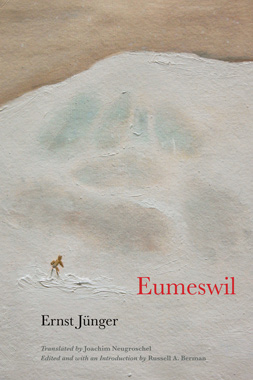Telos Press Publishing is pleased to announce that Ernst Jünger’s Eumeswil is now available for purchase. Order your copy today in our online store.
Eumeswil
by Ernst Jünger
Translated by Joachim Neugroschel
Edited and with an Introduction by Russell A. Berman
 Eumeswil, ostensibly a post-apocalyptic science fiction novel, is effectively a comprehensive synthesis of Ernst Jünger’s mature thought, with a particular focus on new and achievable forms of individual freedom in a technologically monitored and managed postmodern world. Here Jünger first fully develops his figure of the anarch, the inwardly liberated and outwardly pragmatic individual, who lives peacefully in the heart of Leviathan and is yet able to preserve his individuality and freedom. Composed of a series of short passages and fragments, Eumeswil follows the reflections of Martin Venator, a historian living in a futuristic city-state ruled by a dictator known as the Condor. Through Venator, the prototypical anarch, Jünger offers a broad and uniquely insightful analysis of history from the post-historic perspective and, at the same time, presents a vision of future technological developments, including astonishingly prescient descriptions of today’s internet (the luminar), smartphone (the phonophore), and genetic engineering. At once a study of accommodation to tyranny and a libertarian vision of individual freedom, Eumeswil continues to speak to the contradictions and possibilities inherent in our twenty-first-century condition.
Eumeswil, ostensibly a post-apocalyptic science fiction novel, is effectively a comprehensive synthesis of Ernst Jünger’s mature thought, with a particular focus on new and achievable forms of individual freedom in a technologically monitored and managed postmodern world. Here Jünger first fully develops his figure of the anarch, the inwardly liberated and outwardly pragmatic individual, who lives peacefully in the heart of Leviathan and is yet able to preserve his individuality and freedom. Composed of a series of short passages and fragments, Eumeswil follows the reflections of Martin Venator, a historian living in a futuristic city-state ruled by a dictator known as the Condor. Through Venator, the prototypical anarch, Jünger offers a broad and uniquely insightful analysis of history from the post-historic perspective and, at the same time, presents a vision of future technological developments, including astonishingly prescient descriptions of today’s internet (the luminar), smartphone (the phonophore), and genetic engineering. At once a study of accommodation to tyranny and a libertarian vision of individual freedom, Eumeswil continues to speak to the contradictions and possibilities inherent in our twenty-first-century condition.
“Set in a post-apocalyptic future, Eumeswil is a brilliant novel of ideas that explores the corruption of power and conformism, even as the anarchic hero charts a course into an unknown freedom. This is a gripping intellectual adventure that merges the tradition of dystopic fiction with philosophical lucidity and a rare aesthetic sensibility.”
—Adam Johnson, author of The Orphan Master’s Son and 2013 Winner of the Pulitzer Prize in Fiction
“Even today Ernst Jünger’s late writings are overshadowed by his early work, whose focus on war and violence has largely defined the author’s reception in the English-speaking world. In short, the warrior and right-wing revolutionary have received more attention than the mature postwar writer. The novel Eumeswil is a good example of this persistent neglect. Its highly complex and ambiguous narrative is a brilliant work coming out of the modernist European tradition. Jünger’s ironic use of a first-person narrator undercuts any dogmatic understanding of the novel’s worldview, recasting the futuristic claims of the utopian tradition in the mode of skeptical reflections.”
—Peter Uwe Hohendahl, Jacob Gould Schurman Professor Emeritus of German Studies and Comparative Literature, Cornell University
Coming Soon: Ernst Jünger’s Sturm
Publication Date: October 1, 2015
Pre-order your copy today.
Translated by Alexis P. Walker
With an Introduction by David Pan
 Set in 1916 in the days before the Somme offensive, Ernst Jünger’s Sturm provides a vivid portrait of the front-line experiences of four German infantry officers and their company. A highly cultivated man and an acute observer of his era, the eponymous Lieutenant Sturm entertains his friends during lulls in the action with readings from his literary sketches. The text’s forays into philosophical and social commentary address many of the themes of Jünger’s early work, such as the nature of war, death, heroism, the phenomenon of Rausch, and mass society.
Set in 1916 in the days before the Somme offensive, Ernst Jünger’s Sturm provides a vivid portrait of the front-line experiences of four German infantry officers and their company. A highly cultivated man and an acute observer of his era, the eponymous Lieutenant Sturm entertains his friends during lulls in the action with readings from his literary sketches. The text’s forays into philosophical and social commentary address many of the themes of Jünger’s early work, such as the nature of war, death, heroism, the phenomenon of Rausch, and mass society.
Originally published in installments in the Hannoverscher Kurier in 1923, Sturm fell into obscurity until 1960, when it was re-discovered and subsequently re-published by Hans Peter des Coudres, a scholar of Jünger’s work. This translation—the first to be published in English—brings to the English-speaking world a work of literature of interest not only to students of Jünger’s work and of World War I, but to any reader in search of a powerful story of war and its effects on the lives of the men who endure it.
About the Author
Ernst Jünger (1895–1998) was one of the most complex and controversial writers of twentieth-century Germany. Born in Heidelberg, he fought in the German Army during World War I, an experience that he would later recount in his gripping war memoir, Storm of Steel. Though Jünger would serve as a German officer during World War II, his 1939 novel On the Marble Cliffs daringly advanced an allegorical critique of Hitler’s regime. Over the course of his long literary career, Jünger would author more than fifty books, some of which are now available in English translation from Telos Press, including On Pain, The Adventurous Heart, and The Forest Passage.



